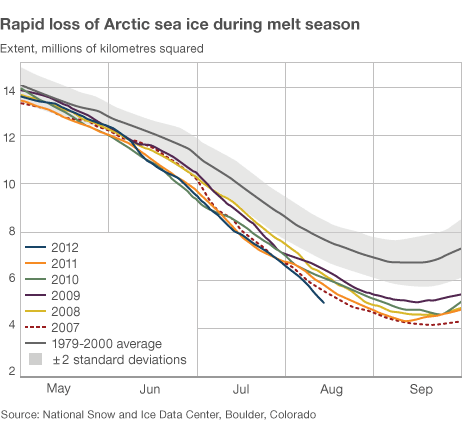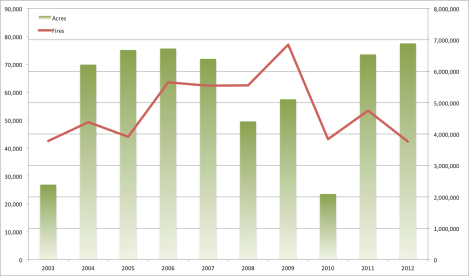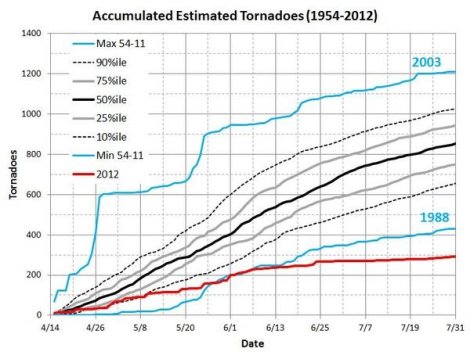
For you. (Photo by Shorts And Longs.)
We’re living in extraordinary times, everyone. We, as a world, keep setting new records — kicking climate ass and taking names and then coughing a lot and feeling dizzy. Just today, we have three new records or near-records to put up on humankind’s trophy shelf, alongside the one that reads “Fight Against Climate Change: Participant.”
U.S. record: Most acres burned by wildfire
As noted by Mother Jones, the United States can boast that 2012 is the burniest year to date in American history. From Jan. 1 until yesterday, some 42,000 wildfires scorched 6.8 million acres across the country. Here’s how that stacks up compared to the last decade.
6.8 million is a lot of acres. It’s as if Connecticut, Delaware, and Rhode Island all burned to the ground in their entirety.
What’s interesting is that the total number of fires is down, but the fires are more destructive. If you’d like to see where fires are burning currently, mapping company ESRI has you covered.
[protected-iframe id=”284cb1aa22b9ce60cb366a2b3bab279e-5104299-36375464″ info=”http://tmappsevents.esri.com/Website/wildfire/index.html?bm=top&ytkw=wildfire&ytr=this_week&twkw=%23wildfire&flkw=wildfire&xmin=-14228352.882127978&ymin=3472380.1323284437&xmax=-9629901.260493&ymax=6720648.086334431&embed=1″ width=”470″ height=”400″ frameborder=”0″ scrolling=”no”]
U.S. record: Fewest tornadoes in decades
The horrible drought that’s gutting the Midwest and devastating our nation’s food supply has at least one benefit: fewer tornadoes. From LiveScience.com:
Since the middle of April, this is the quietest year for tornadoes in the country since the 1950s, when relatively detailed records began, said Harold Brooks, a research meteorologist at the National Severe Storms Laboratory in Norman, Okla.
The nation would expect to have 850 tornadoes on average from mid-April to the end of July, Brooks told OurAmazingPlanet. But, he said, there have been fewer than 300 to date. That’s about 100 fewer than have ever been recorded in this 3.5-month stretch, he added.
What that looks like:
As for why:
Why have there been so few twisters in the past 3.5 months? You can blame it on a high-pressure “heat dome” over much of the country that began forming in mid-April and has pushed the jet stream north into Canada, Brooks said. This heat dome is also a reason for the record drought that has gripped much of the country.
This dome of high pressure has led to less precipitation and fewer thunderstorms — thus fewer tornadoes, which can only form in these storms, Brooks said.
Less moisture means fewer storms, fewer storms means fewer tornadoes — but fewer tornadoes means more wicked witches. Every silver lining is accompanied by a cloud.
World record: Least Arctic ice (unofficial)
From the BBC:
Arctic sea ice looks set to hit a record low by the end of the month, according to satellite data.
Scientists at the US National Snow and Ice Data Center said data showed that the sea ice extent was tracking below the previous record low, set in 2007.

Note: Every year for the past five has been well below two standard deviations from the average ice level seen during the last two decades of the 20th century.
So congratulations all around, everyone. I very much look forward to the day, some 60 years from now, when my grandchildren, sheltered in their dust houses from the 150-degree heat, use CyberGoogle to look up things I’ve written and see this post. There in Nashville, on the shores of the Atlantic, I can only hope that they understand this post isn’t meant to be sarcastic at all — but rather my sincere celebration of how my generation (and my parents’ and their parents’) have crafted a whole new world for them to explore and fight over.
You’re welcome, kids.





